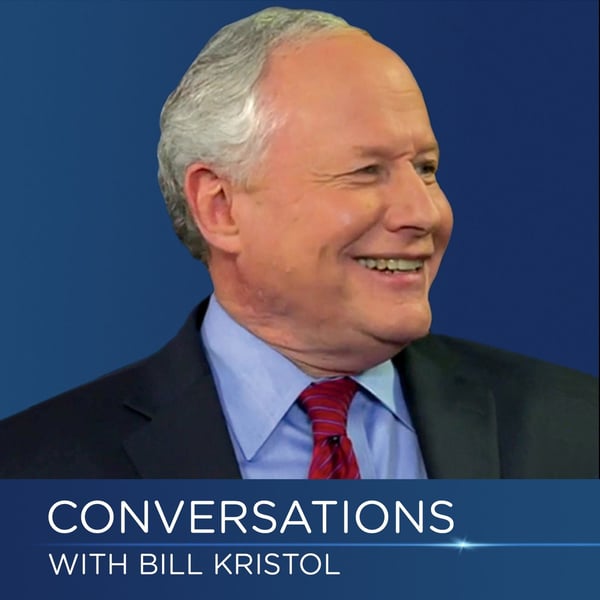Robert Kagan on American Foreign Policy Between World War I and World War II—and Beyond
Conversations with Bill Kristol
Conversations with Bill Kristol
4.7 • 1.7K Ratings
🗓️ 4 April 2023
⏱️ 81 minutes
🧾️ Download transcript
Summary
Transcript
Click on a timestamp to play from that location
| 0:00.0 | Hi, Bill Crystal here. Welcome back to Conversations. I'm very pleased to be joined for the second |
| 0:19.6 | time by Bob Kagan, Robert Kagan, distinguished historian and commentator on foreign policy and |
| 0:27.0 | other matters. We did a conversation, Bob, in 2019 shortly after, will you let that book, |
| 0:32.7 | The Jungle, goes back, short book in 2018 and a long article, The Strong Man, Strikes Back, |
| 0:38.1 | Strong Man, Strike Back in 2019. And I've got to say I look back at both the conversation |
| 0:42.4 | of those short book and the article, and they stand up very well, unfortunately, in 2023, |
| 0:48.8 | the jungle continues to try to grow back. I guess we're pushing back a little bit against the |
| 0:54.5 | jungle in the former Putin, but anyway, we're here to discuss that a little bit more importantly, |
| 1:01.1 | Bob's new book, The Ghost at the Feast America and the Collapse of World Order in 1900s and 1941, |
| 1:07.3 | a magisterial history of those 40 years. It's the second volume of Bob's history of American |
| 1:13.1 | foreign policy, the first dangerous nation from the beginning to 1900. And Bob Kagan is also |
| 1:18.6 | a senior fellow, and that also is a senior fellow at the Brookings Institution. So, Bob, |
| 1:23.6 | thanks for joining me again. Great to hear, Bill. Thank you. So I want you to read the book, |
| 1:28.4 | and we won't go through it on, you couldn't go through it in all the detail and so many interesting |
| 1:33.1 | stories and perspectives in it. I thought maybe I'd just begin by asking about the title, |
| 1:37.0 | which they can get us into an interesting discussion of World War One and post-World War One |
| 1:41.6 | and domestic politics and foreign policy, but The Ghost at the Feast, that's an elegant, |
| 1:46.4 | elegant title for foreign policy history. Well, I got it from the great British diplomat Harold |
| 1:54.3 | Nicholson, who was present at Versailles in 1919 and helped negotiate the ultimate, you know, |
| 2:04.0 | peace treaty. But what he records in his memoirs is that, you know, for everybody who was |
| 2:11.2 | participating in those talks, there was one great fear, which he referred to, he basically said, |
| 2:17.2 | the notion that the American people might not abide, but whatever commitments Wilson made, |
... |
Please login to see the full transcript.
Disclaimer: The podcast and artwork embedded on this page are from Conversations with Bill Kristol, and are the property of its owner and not affiliated with or endorsed by Tapesearch.
Generated transcripts are the property of Conversations with Bill Kristol and are distributed freely under the Fair Use doctrine. Transcripts generated by Tapesearch are not guaranteed to be accurate.
Copyright © Tapesearch 2025.

